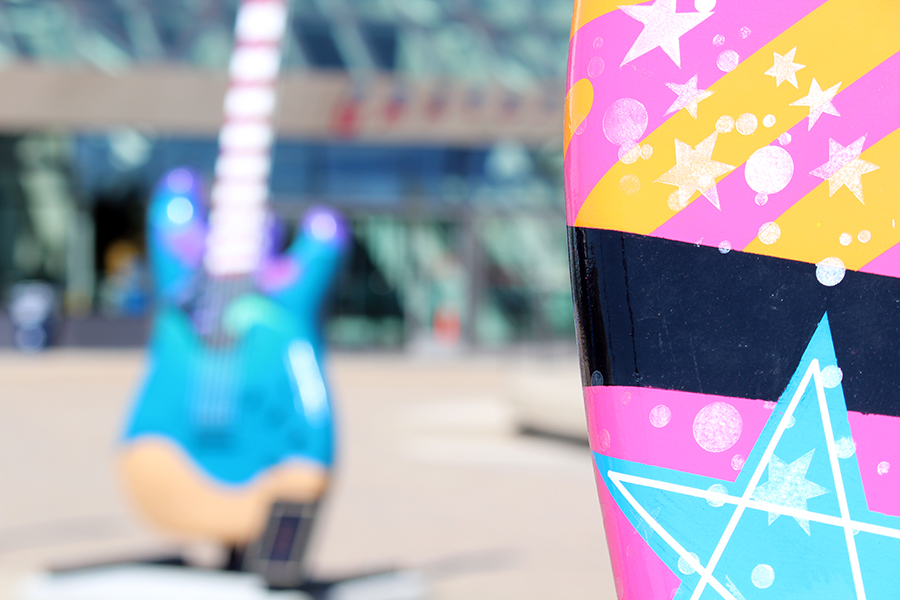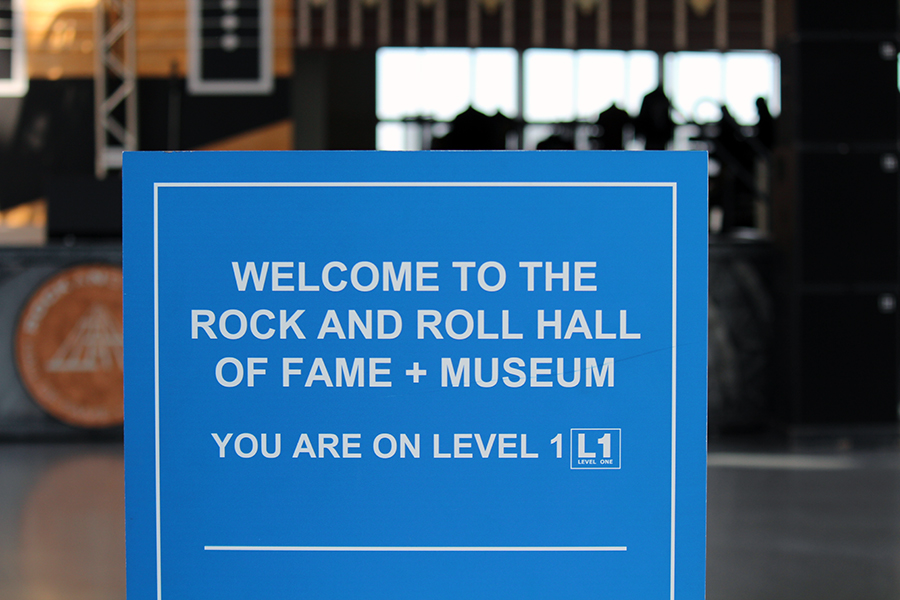
If, like me, you grew up in the 90s, you’re probably familiar with the phrase “Cleveland rocks!”—an old rock song that was used in the introduction for the Drew Carey Show.
I suppose I always knew Cleveland had some sort of history with rock & roll and music, but until I lost myself inside Cleveland’s Rock & Roll Museum, I did not realize how extensive of an history it is.

The Rock and Roll Museum is located, fittingly at the end of Rock & Roll Boulevard. Because the museum famously inducts musicians (and other notable industry rockers), I think there’s this assumption that the museum caters to an older crowd. Especially because it’s an historical museum. But that theory did not hold up on my visit.
This museum is not just for hard-core Deadheads. If you have ever believed in the power of song, the political movements from the past 65 years or had a fleeting interest in the radio, then the Rock and Roll Museum will prove to be not only enlightening and interesting, but fun and informative.
Visiting the museum
I found Cleveland’s Rock & Roll Museum to be an excellent place to spend a few hours. The visit starts downstairs where you can a brief history of rock and roll—where the term comes from, initial reactions to the music and how it has evolved over the years. Early in the exhibit was an area all about the backlash against the rock and roll movement.
Three video monitors showed footage from protests against the music genre. Attack words like “rebellion,” “communist ideology,” “degrading,” and “just blatant, raw sex.” Reverend Jimmy Snow famously derided rock & roll for its “beat.”
Learning about the many controversies surrounding rock music, it’s hard not to feel a bit of pride for those that changed music as we know it. Music is a powerful thing and the Cleveland Rock & Roll museum celebrates it in all its glory.
The museum is full of quirky artifacts and relics from the history of rock and roll—everything from costumes and cars to guitars and concert wristbands. You’ll see whole exhibits on the punk scene in New York City, Jimi Hendrix’s 1967 TWA luggage (for which he was a brand ambassador), Atlantic Records and the indie scene made popular by bands like New Order and Joy Division. Oh, and Elvis was there too.
Alan Freed & the definition of rock and roll
Freed—the Moondog, a crazed hipster who talked over the music, howled, pounded on phone books and banged on a cowbell.
Alan Freed, a Cleveland, Ohio disc jockey, was one of the first inductees to the Rock & Roll Hall of Fame. He’s also the man who is most credited with coining the term “rock and roll” to describe the black rhythm and blues records he began playing in 1951. The music proved popular regardless of race and it was the Moondog Coronation Ball on March 21, 1952.

The oversold music gig is generally regarded as the world’s first rock concert but a riot prevented the show from even happening at all. Freed eventually relocated to New York City where he promoted rock music as the genre grew and grew.
And because Cleveland just keeps on keeping cool, even the Ritz-Carlton has embraced the city’s rock and roll history. The sixth level of the downtown Cleveland Ritz offers martinis and other cocktails with a rock/roll theme. Everything from an AC/DC Martini to one called “Bad Romance.”
Disclosure: my visit to the Rock and Roll Museum & Hall of Fame was sponsored in part by Cleveland Tourism and the State of Ohio.

In 2009, Adam Groffman quit his job as a graphic designer in Boston and went on a 15+ month trip around the world. The life-changing journey took him to places like North Africa, the Middle East, India and Southeast Asia. Since 2011 Adam has been living in Berlin—Europe’s most hipster city.
Travels of Adam is a hipster travel & lifestyle blog for sharing his personal experiences and alternative & indie travel tips from around the world. He also is the editor of My Gay Travel Guide—a gay travel website written by gay travelers for gay travelers.








